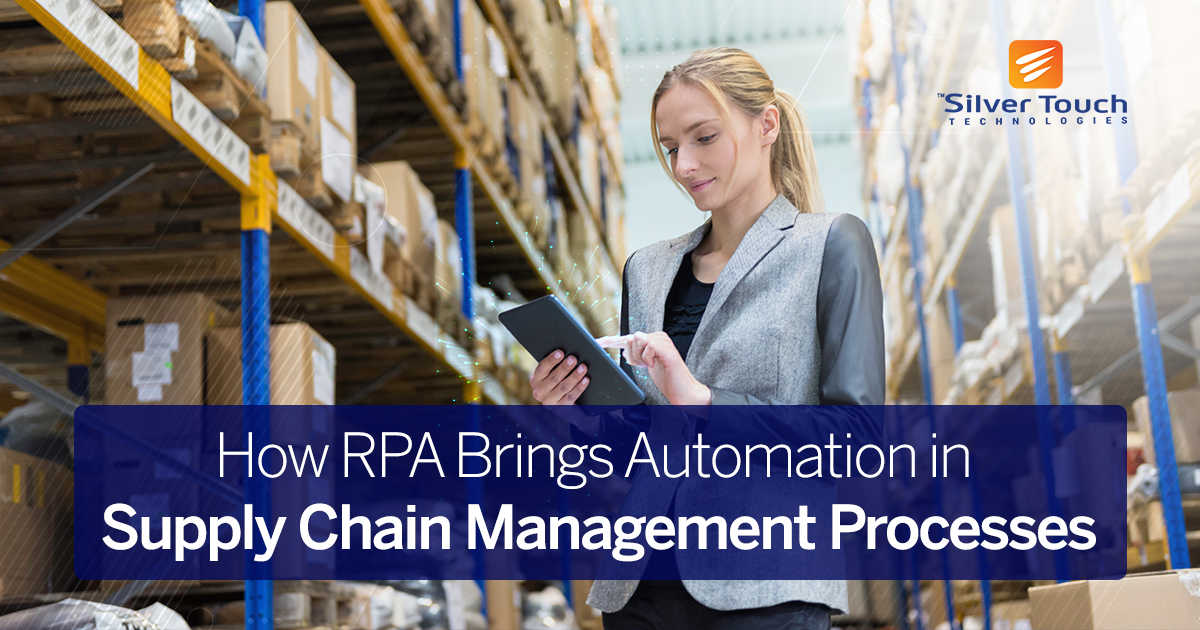Robotic Process Automation (RPA) has gained ground swiftly in the corporate world. Various companies across different industry sectors are ready to embrace automation for their processes, and as a result, it is expected that the RPA market will reach $12 billion in the next couple of years. A KPMG report has predicted that automated or robot-based labor will replace as many as 47% of the jobs in the next decade or two.
RPA implementation services cover all the departments of companies to ensure a seamless automation process. In this article, we will see the impact of customized RPA solutions on supply chain management (SCM). The core objective of robotic process automation is to bring automation in mundane and repetitive tasks. A typical supply chain network involves many repetitive activities that the staff handles.
However, manual handling has room for errors and it ultimately slows down the operational process at your workplace. Here, customized RPA software can lend a helping hand by reducing human errors and maintain consistency in the daily business processes. What’s more, automation gives your employees ample time to focus on thinking innovatively and putting more effort into accomplishing various productive tasks.
Read this blog to know the significance of RPA in supply chain management processes. We will start by showing the difference between traditional and RPA-based workflow systems. ERP and CRM are some of the known examples of traditional workflow systems. This type of workflow system can execute tasks with fixed sequences and limited or minimum conditions. The traditional workflow system uses APIs for backend integration.
How RPA-powered Workflow System is Different than Traditional System?
RPA can extend the capabilities of the traditional workflow by bringing a rule-based engine to perform repetitive actions. What’s more, knowledge management is manual in the traditional workflow, whereas, RPA system can readily capture various data patterns for unique situations. Enterprises use the analysis of these patterns for bringing improvement in processes. What’s more, the traditional workflow has not self-learning capabilities like RPA-powered workflow.
RPA developers can easily integrate the system with machine learning and AI to understand various scenarios and act accordingly. Finally, the traditional workflow cannot manage unstructured data effectively, but RPA can capture such data with the help of features like OCR (Optical Character Recognition). After going through the difference between the RPA and the traditional workflow system, we will see RPA implementation in supply chain management.
Also Read- Five Ways that show Process Mining and Robotic Process Automation Made for Each Other
Order processing, payments, partner on-boarding, invoicing, procurement of raw materials, inventory management, supply, and demand-based planning, and customer support are some of the most common processes of the supply chain that can be automated effectively. As mentioned above, RPA eliminates manual input for all the tasks across various departments. Whether it is an administrative aspect or order-purchasing, RPA brings automation everywhere.
The RPA-based system can also handle proposals, questions, and quotes for taking your business to a new level. RPA implementation can automate B2B processes cost-effectively. Your business can leverage the benefits of RPA implementation by hiring dedicated RPA developers. Experts and researchers recommend foundational updates to ensure the seamless performance of RPA. It is better to consult a reputed offshore software development company to know the scope of RPA.
Key Areas for RPA Implementation in Supply Chain Management
1. Improved Communication
RPA can handle email-related processes like reading emails received from related parties. It can extract useful information from an email for further analysis and processing. What’s more, the RPA-based system can also examine shipment status and send automated replies to the customers in a preset manner. It can continue this process in the next email as well.
2. Performance Management
Vendor-supplier performance management holds a key to manage the supply chain efficiently. RPA can track the performance of suppliers by using their SLAs or KPIs (Key Performance Indicators). If there is even the slightest deviation from the preset SLAs/KPIs, then the RPA system generates an alert.
3. Vendor Supplier Relationship Management
It is easy to communicate with vendors as RPA can make a request for proposal (RFP) and request for quote (RFQ). It also analyzes the documents received and evaluates the suitability of vendors effectively.
Concluding Lines
Reliable RPA implementation services can unleash the potential of RPA in supply chain management. It is fair to mention that RPA implementation can increase efficiency and save costs in various processes of SCM. But then, for effective implementation of RPA, you need to take care of several aspects including a simple and standardized development process, robust IT infrastructure, and capability of work culture to absorb automation in the processes.
Silver Touch Technologies UK is a renowned custom software development company. We integrate the advancements of RPA, cognitive bots, and Business Intelligence (BI) to develop end-to-end process automation solutions. Do you want to stay ahead of the curve by bringing automation into your workflow? Simply send us an email at info@silvertouchtech.co.uk and we will contact you soon with the strategy.





